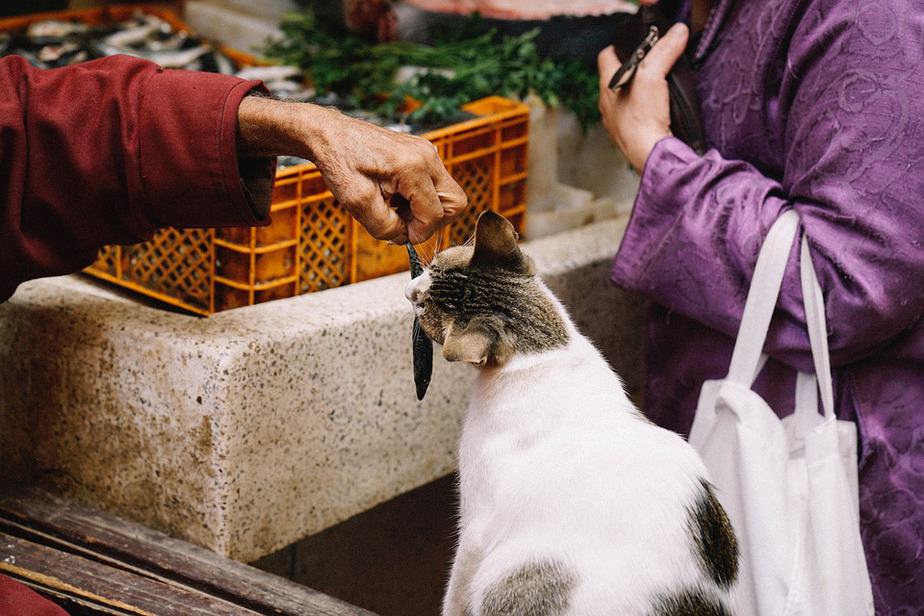📖 Table of Content:
Raw foods can be a bit contradictory. Some people would die for sashimi, while others can’t bear the thought of it. We know who would love to have some of it, right? If you have a kitto who’s determined that you share your sushi with him, you may want to know: Can cats eat sashimi?
Sashimi, which means “pierced body,” is a Japanese dish consisting of thinly sliced fish or some other types of meat. It’s served raw, with only soy sauce as a condiment. This allows the meat’s taste to shine through.
Sashimi-grade fish is some of the best seafood available. Tuna, salmon, yellowtail, and squid are some of the most popular sashimi varieties.
Can cats eat sashimi safely?
To an extent, sashimi can be bad for felines. It may come as a shock, but raw fish, or any raw seafood for that matter, is not recommended for feline ingestion. There are a variety of reasons for this, and we’d be pleased to present you with some.
Anisakis parasitic nematodes can be found in raw fish on rare occasions. These parasites can be killed by cooking or freezing. You shouldn’t worry about feeding your cat some fish as long as you cook it.
Furthermore, seafood often contains high levels of mercury. This is a naturally occurring harmful build-up of heavy metal that can make your cat unsteady and dizzy.
Larger fish, on the other hand, are more prone to cause mercury poisoning. Sashimi, just like sushi, comes in small portion sizes, so the risk is low.
Both your cat’s health and your stress levels will be saved if you rather just cook the fish for him. By thoroughly cooking fish at a high temperature, all pathogens will be destroyed. It’s also easier for your cat to chew and digest.
While cooking it, make sure you don’t add any seasonings or spices. By using table condiments like salt, you’re endangering your pet. Cats can get sodium poisoning if they consume too much salt.
And if your cat eats seasoned and spicy sashimi, he may develop a range of digestive problems, ranging from nausea and vomiting, to other mild symptoms such as diarrhea.
Chemical compounds
PCBs can be found at significant concentrations in a variety of fish. PCBs are industrial compounds that eventually find their way into the water system, where they are consumed by fish. In large quantities, they can cause serious side effects.
These chemicals have been linked to an increased risk of some cancers as well as harm to a developing fetus. Wild-caught fish as well as farmed one, usually eat a PCBs-rich diet. So, it’s not the best idea to give them to your pet as they’re harmful.
Raw fish also includes thiaminase, which works to deplete your pet’s thiamine levels.
You probably already know that cats can’t thrive without thiamine as a low quantity of it easily causes symptoms like dilated pupils, incoordination, falling, seizures, and many more.
Another chemical element found in seafood that can be dangerous to cats and even humans is ethoxyquin. It’s an actual cause of allergic reactions, arthritis, heart or even kidney failure, among other things.
Food allergies
It may be unheard of, but some cats are allergic to certain types of seafood. It’s one of the most prevalent causes of vomiting and diarrhea in cats.
Common symptoms of an allergic reaction tend to be itchiness and inflammation which then can lead to excessive grooming and hair loss.
Felines may be allergic to certain foods from birth or acquire an allergy as they age. Some cats outgrow it once they reach adulthood. Not every cat is so fortunate, though, as it’s not uncommon to have cats develop an allergy later in life.
Stomach sensitivity is also a symptom of an allergic reaction. Anaphylaxis, which can be life-threatening, can also occur in rare circumstances.
Can cats eat sashimi with soy sauce?
Humans can consume soy sauce because it’s beneficial to their health, but cats can’t. While soy sauce is used in a variety of dishes, it shouldn’t be served to your kitto.
There’s no need to be concerned about a lick from your bowl now and then. Unless your cat has a history of allergies. Cats are prone to soy sauce allergies, so watch what your feline consumes.
Because of its high salt concentration, soy sauce in big doses can be harmful. This can result in sodium poisoning, which can lead to serious medical problems.
What’s the difference between sushi and sashimi?
Sushi is separated into two types: maki, which comes in rolls, and nigiri, which comes in individual pieces. Knowing the difference between sushi and sashimi might help you order something you’re sure to appreciate.
Nigiri and maki are distinguished mostly by the manner in which they are prepared and presented. Maki is possibly the most well-known variety of sushi.
The fish, veggies, or other components are folded up inside seaweed (nori) and vinegared rice in a maki roll. It’s then chopped into circular bite-size pieces and served in rolls.
Sushi and sashimi are frequently mixed up because many people associate sushi with raw fish. Sashimi is a Japanese cuisine that consists solely of thinly sliced raw fish (or other meat) and doesn’t include rice.
To wrap it up
To conclude whether cats can eat sashimi, we have explained some of the most important facts about raw food. Can cats eat sashimi without any consequences? No one can guarantee. Although sashimi is free of any dangerous fish bones, it’s best to stay off your cat’s menu.
It has the potential to contain pathogens that can make your cat sick. Uncooked meat can spread a range of diseases to cats, some of which are lethal.
Cooked fish is a healthy option that may be given in moderation. Avoid using sauces or seasonings while cooking seafood for your pet, such as squid. Spices and soy sauce are difficult to digest and might cause unnecessary gastrointestinal distress.



